Online casino games lacked an authentic feel earlier. Early versions used basic graphics and computer results. Many players missed the feel of a real table. The arrival of live dealer games changed this scene.
Real dealers run the live dealer gaming from studios in real time. Players can watch every activity like card dealing and wheels spinning live. Live play helped to build trust and make the play feel realistic. Live play experience is improved by better internet and clearer video.
Today, live gaming covers more than poker. Platforms like the Casiny live casino offer full live dealer rooms that feel like an actual casino visit.

What Makes Live Dealer Suites Feel Real?
Being fully involved in a game is called Immersion, without just watching it. Live dealer suites recreate this by mirroring the real casino environments.
Key features include:
- Real dealers, who run games live, keep players updated through live chat
- The addition of wheels and real cards, instead of digital results, increases players’ interest in live games.
- Players follow live action via good lighting, HD videos and close-up views.
- Tracking of bets and switching of tables is made effortless through Interactive tools
Platforms like Casiny use these immersive features to offer a more engaging and realistic live casino experience.
Tools and Tech Powering Live Casino Games
Real-time technology makes live dealer games work. Real-time action helps games feel clear and trustworthy.
Main tools behind live dealer suites are:
- Instant card recognition: Reads cards and results instantly.
- Multi-camera views: Offers full table and close-up views.
- Fast streaming: Reduces the delay between action and display.
- HD and 4K streaming: Shows cards, chips, and wheels clearly.
These features help players trust what they see. Real actions happen live, with no hidden results.
Popular Live Dealer Game Formats Available
Live dealer suites feature more than poker, which lets players select how they want to play and what they watch.
| Game Format | Description |
| Live Roulette | A physical wheel spins on camera in real time. |
| Live Baccarat | Simple rules with live dealing and fast rounds. |
| Live Blackjack | A real dealer at a live table deals the cards. |
| Live Poker Variants | Includes Texas Hold’em and Three Card Poker. |
| Game Show–Style Live Games | Live hosts, wheels, and bonus rounds in studio settings. |
This variety gives players control over pace, style, and viewing experience.
How Live Dealer Suites Influence Player Behaviour
Live dealer suites have highly affected people’s way of playing in online casinos. They make game experiences more realistic.
- For a customised experience, pick dealers, adjust table settings, or save games.
- Talking with dealers and other players makes the game experience more engaging.
- Join or watch several tables simultaneously to follow different games easily.
Live Dealer Gaming vs Standard Online Casino Games
Here’s a simple look at how live dealer games differ from standard online games:
| Feature | Live Dealer Casino | Standard Online Casino |
| Dealer presence | Real human dealer handles cards and bets live | Computer-generated dealer or automatic system |
| Game transparency | Players see all actions as they happen | Outcomes decided by random number generators |
| Pace of play | Real-time, paced by dealer and table action | Rapid, automated game rounds |
| Social interaction | Chat with dealers and other players | Minimal or no interaction |
This comparison provides the key differences without favouring either. Live dealer game suites focus on realism and social play. Standard games prioritise quick and computer-controlled rounds.
Safe and Responsible Play
Key Safety Tips:
- Before starting your play, set limits for time and money.
- Remember that wins are not guaranteed, but losses can happen.
- Platforms like Casiny live casino provide rules and betting guidelines for players to follow.
- Take breaks and strictly follow the limits.
Enjoy live games as entertainment, not for income.
Conclusion
Live dealer suites bring the feel of a real casino online. They use:
- HD video quality
- Real dealers and
- Interactive features
All these characteristics make live dealer games more immersive than standard online games.
Live dealer features that fascinate players are:
- Blackjack, roulette, baccarat, poker, and game-show style games.
- Personalisation features to control experience and viewing preferences.
- Access to a realistic, engaging environment from home.
Casiny live casino and similar Australian platforms highlight how live dealer games combine trust, interaction, and immersion for an innovative online casino gameplay.
As Australian online casino players seek entertainment and new adventures, understanding the deposit process at online casinos becomes more crucial in 2026.
The landscape of online gambling is always adapting to meet players’ needs, with operators frequently integrating various new payment methods at their virtual cashier to enhance convenience and security.
On platforms like Dotesports, players can learn more about how these changes affect their gaming experience. Here is a closer look at the standard deposit process that you will most likely encounter on a fully licensed and regulated online casino and sports betting platform.

Understanding the standard deposit process
Depositing funds into your online casino account is typically straightforward. However, the process will slightly vary depending on exactly which method that you decide to use to top up your account with funds to play your favourite games.
With that said, here’s a simple step-by-step overview of the process:
- Choose your online casino: The first step is selecting a reputable online casino that suits your gaming preferences. Take time to review their payment options, bonuses, and security features
- Create a new free account (if you don’t already have one): After selecting a casino, you’ll need to register for an account. This usually involves providing personal information such as your name, email address, and age. It’s essential to choose a secure password and verify your identity if required via the KYC (Know Your Customer) process
- Access the cashier section: Once your account is active, head to the cashier section, which is where you can start the deposit process. Most online casinos have a clearly marked ‘Deposit’ button
- Select your preferred payment method: In 2026, there are numerous payment methods available for Australian players. After choosing one, follow the simple onscreen instructions that apply to that method.
- Enter the desired amount: Input exactly how much cash you wish to deposit, providing it falls within the casino’s required min/max limits for your chosen payment method
- Confirm the Transaction: After entering the amount, you will be prompted to confirm the transaction. Depending on the payment method, you may be redirected to your bank or payment provider for verification
- Receive Confirmation: Successful transactions usually result in immediate account crediting. You may receive a confirmation email, confirming that your deposit has been processed. It’s that simple
Popular Australian Online Casino Payment Methods
As Australian players enjoy a range of payment options, understanding these can help streamline the deposit process. Here’s a quick list of some commonly used payment methods:
- Credit/Debit Cards: Visa, Mastercard, Maestro
- E-Wallets: Skrill, Neteller, MuchBetter
- Cryptocurrencies: Bitcoin, Ethereum, Litecoin
- Payment Services: ApplePay, Jeton, Flexepin
- Prepaid Cards: Paysafecard, CashToCode
While some casinos offer a wider selection of payment methods than others, most will ensure that players can find at least one convenient option.
Always remember to carefully review the safest, cheapest, quickest, and most convenient Australian online payment methods available, as each option may have different minimum and maximum deposit limits.
Factors to Consider During the Deposit Process
When depositing at online casinos in Australia, there are several factors to keep in mind:
- Deposit Limits: Each payment method will usually have different minimum and maximum deposit amounts. Make sure to understand these to avoid any issues when attempting to fund your account.
- Processing Times: Most deposits are processed instantly, but some methods may take longer. E-wallets tend to be quicker compared to bank transfers.
- Transaction Fees: Be aware of any potential fees associated with specific payment options. Some online casinos absorb these fees, while others may pass them on to players.
- Withdrawal Options: The payment method chosen can impact your withdrawal process. It’s advisable to use the same method for withdrawals as you do for deposits to ensure a seamless experience.
Final Thoughts
Depositing at online casinos in 2026 is designed to be an easy and secure process, catering to the preferences of Australian players. By understanding the various payment methods, fee structures, and transaction times, you can enjoy a smooth gaming experience.
Always ensure that you choose a reputable online casino that prioritises your security and offers the payment methods you prefer. With these insights, you are now well-prepared to deposit funds and dive into the thrilling world of online gaming.
The important thing to remember before depositing is that you are never guaranteed to win. Therefore, take steps to be a responsible gambler from the moment you sign up to the moment you sign out.
Start by setting yourself a sensible spending budget and then, if your casino has them, use their safer gambling tools, such as deposit limits, reality checks/session time reminders, and win/loss limits. Doing so will keep things safe and fun for everyone involved.
Poker has always been about people first. Tables full of players sitting with their chips stacked carefully. Long sessions where reading the room mattered as much as reading the cards. For decades, that was the image most people connected with poker. Then computers changed everything. Mobile devices have pushed that change even further.
The shift to mobile did not happen overnight. Poker moved from physical tables to desktop screens first. It then moved gradually into pockets. What is interesting is how naturally the game made that journey. The tools changed, but the core never really did.

From Physical Tables To Digital Screens
Originally, poker lived in physical spaces. In-person games defined the experience. Body language mattered. Table talk was a big part of things.
When online poker appeared on laptops and desktop computers, the environment changed. Players lost physical cues, but gained convenience. Tables ran all day. Games became easier to access while global play became normal. Being able to access poker online relied on interfaces that allowed people to see what their opponents were doing in terms of betting. Interfaces and casino platforms have also been on a journey over the last 10 or 20 years.
The move to mobile simply continued that path. With increasing mobile internet speeds, poker could happen anywhere. The game did not lose its identity. It just became more flexible.
Mobile Interfaces Changed How Poker Feels
Mobile poker works because interfaces evolved carefully. Early mobile apps struggled with small screens – modern options have adapted well.
Cards are large enough to read instantly. Buttons are spaced clearly. Betting sliders feel smooth rather than awkward. Animations and even sound effects can help players follow the action without confusion.
Information also appears more cleanly now. Stack sizes and player actions sit in logical positions. The goal is clarity rather than complexity. Mobile apps learned to respect screen space rather than overcrowd it.
The best mobile poker interfaces feel calm. They present only what matters at the right moment.
Playing Anywhere Changed Everything
Mobile devices removed the location from poker. Games no longer require a desk or specific setup. A session can happen during travel or anywhere with a stable connection. It is not uncommon for people to log in and play while they are on their commute on the train or in a waiting room.
This flexibility changed habits. Poker sessions no longer need long blocks of time. Short sessions became normal (especially in cash games).
This accessibility helped poker stay relevant in a fast-moving digital world. The game fits modern routines instead of competing with them.
Strategy Still Matters Just As Much
Mobile poker did not simplify strategy. The same principles still apply. People can spend time going through individual scenarios and working out how they might approach things. Social media content means there is more available for players to research.
View this post on Instagram
What changed is how information is processed. Players rely more on betting patterns and timing rather than physical behaviour. That shift already started with online poker years ago.
Mobile play also encourages a level of focus. Fewer distractions exist on a single screen compared to busy physical rooms. Many players find this helps decision-making feel cleaner.
The fundamentals remain untouched. Certain traits matter just as much on mobile as they did at physical tables.
Mobile Play Created New Rhythms
Mobile poker introduced a slightly different pace. Some decisions happen faster. Multi-tabling works differently on small screens and changes how some players approach volume play.
People have gotten used to the idea of playing all kinds of games on mobile. The market is continuing to grow and is predicted to get even bigger by 2030. Poker slots into that nicely.
Shorter sessions also influence mindset. Some players treat mobile poker as part of their daily routine rather than a dedicated event. This does not remove depth. It just changes how often decisions happen.
The rhythm of mobile poker feels modern. Fast when needed. Calm when the game slows down naturally.
Technology Helped Poker Fit Mobile Naturally
Faster internet made real-time play smooth. Touchscreen design made actions intuitive. Secure login systems removed friction from joining games. Mobile screens even come in more sizes now, and there are some bigger screens for those who prefer this.
Battery efficiency improvements also helped. Longer device life means longer play sessions without interruption.
Why Poker Works So Well On Mobile
Poker translates well to mobile because the game is built around information and decisions rather than physical action. Cards are easy to display digitally. Betting choices translate naturally to touch controls.
Unlike some games that rely on complex movement, poker relies on thinking. That makes it perfect for smaller screens and portable play.
The game also scales easily. Low-stakes tables and high-level tournaments can exist in the same mobile environment. People can choose which they’d rather play.
As mobile technology keeps improving, poker will likely keep adapting quietly without ever losing what made it work in the first place.
This Spring, the ATLARGE group (a subset of the BARGE group) will be celebrating 30 years of fun get togethers, tournaments, and ridiculous pink chip games. The group has varied in size over the years, but I’d say there will probably be 70-80 people showing up for what will likely be a ToC (Tournament of Champions format of Hold’em, Omaha 8, and Stud), a NLHE tournament, and some variation of an Omaha tournament.

My Personal ATLARGE History
I remember when I attended my first ATLARGE. It was in the Spring of 2009 and it was held at the Taj (RIP). I happen to know the year specifically not because I cashed anything and it is recorded in Hendon Mob but because my then wife and I were recovering from a miscarriage and trying again for our one-and-done. Little did I know that my pitseleh was already baking on board and would change my life forever late that same year.
While I was hanging out in Atlantic City, I got word from my best friend that he and his wife were pregnant with triplets! 2009 was a crazy year for me as I was also considering quitting my corporate job and starting a new business, I just hadn’t figured out what it would be yet and a few months later I got laid off “thanks to the economy” so the decision was made for me.
So there I was, a 34-year-old guy with a mostly freshly minted bachelor’s degree thanks to a 13-year lack of direction and floating through life like a leaf on the wind. I had a mortgage, a wife, and was trying for that one-and-done and at the same time, I had a growing passion for poker.
I’m not ashamed to say I was influenced by the Moneymaker Effect. One of my friends began hosting home games after Moneymaker’s win. I played in my first home game tournament because of him (and made my first Royal Flush that night, which led to me winning the tournament). After that, I got hooked on this crazy card game that allows you to make money!
I attended BARGE for the first time in 2007 and decided this was a thing I would never miss. By 2009, Goldie — the organizer of ATLARGE — basically said I have no more excuses for not attending ATLARGE since it is on the East Coast, just like me.
Atlantic City or Bust
It turns out that Atlantic City is not all that easy to get to if you’re from outside the Northeast. That first time I attended, I flew from South Carolina to Charlotte, then to Philadelphia. I took a train from the airport to the train station, then switched to another train to take me to Atlantic City. Finally, I was able to take a Jitney (a short bus) from the train station to the Taj. All told I think it took longer than for me to fly to Vegas! 🙂
Since then, I’ve mostly kept that same kind of route, though I do experiment occasionally to see what’s better. A few years ago, I took Amtrak up the coast to Philly and then transferred to Atlantic City. One year, I drove. Sometimes, I fly into Philly and catch a ride with a friend. There are no direct routes, but the journey is always part of the adventure.
This year, I’m going to be flying into Philly and then taking the American Airlines bus from the Philly airport to Atlantic City. That’s right — American Airlines runs a direct bus from PHL to ACY! It even gets a flight number, but you are riding a bus.
It’s Not the Stakes; It’s the Experience
Getting back to my 2009 ATLARGE experience, I busted out of the poker tournaments early and had a very limited bankroll. It was around Saturday evening that I was basically moping around on the periphery of the poker room, not playing, just hanging out. A friend of mine named Alex told me to get over myself and sit in the pink chip game and have some fun. “How much is it?” I asked. “Blinds are $7.50/$15. It’s a great game!” He said.
I had never played that high. I was a $2/4 or $3/6 guy and mostly just Hold’em up until then. Alex told me he would take half of my action if I would just sit in the game. How could I refuse?
Let me tell you… that was an amazing game! We ended up sitting next to each other. I think I had position on Alex, which was awesome because not only was he bankrolling half my action, but I could raise him with his own money! Many folks who sat in that game were acquaintance-friends but several of them would go on over the years to become extremely close to the point that even now I talk with them every day. However, that night I don’t think they were finding me endearing.
Alex would raise or 3-bet. I would re-raise and these folks would be sitting in good position with good cards and inevitably either Alex or I would win at showdown with some garbage because we weren’t just aggressive but also got lucky!
More than one frustrated player called me an a—hole that night, but I didn’t take offense. Instead, I just clapped with unabashed glee and gave them my biggest dumbest grin and collected pot after pot. Thank you Sir, I’ll have another! Don’t get the wrong idea… there are truly no hard feelings in the ARG community. Maybe you bad beat someone and it annoys them, but 5 minutes later they will invite you out for a meal or a cocktail.
At the end of that first trip, I was probably down a little or breakeven, which for me was a win. I had a great time and met so many new people who really were there to not just play competitively but to enjoy themselves. No hats and sunglasses, just smiles and friendly verbal jabs.
ATLARGE 2026 DATES
Come on out to ATLARGE 2026, taking place from April 17-19 and experience it all for yourself. We will be at the Borgata poker room. You should register in advance at https://atlargepoker.com. Registering gets you a name badge (makes it so much easier than having to remember everyone’s name) and the ability to play in our tournaments. Goldie will probably give you a card protector, too! If the website hasn’t been updated for 2026 by time you read this then check back shortly. This is a one-man not-for-profit show, so give Organizer Goldie some grace.
Fast growing online poker site CoinPoker has announced the signing of top poker pros Johan Guilbert (a.k.a., YoH Viral), Mariano Grandoli, and Brantzen Wong as ambassadors for the platform.
The move marks a significant expansion of CoinPoker’s ambassador team. Together, the three ambassadors represent elite tournament results, top-tier live cash games, and modern poker video content at the highest level.
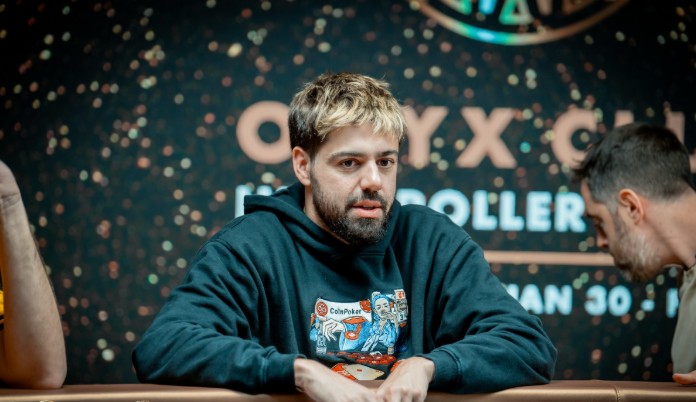
By adding YoH Viral, Mariano, and Brantzen at the same time, CoinPoker reinforces its commitment to representing every aspect of modern poker.
Each ambassador brings a different background, audience, and playing style, reflecting the platform’s focus on skill, fun, and entertainment.
👀 Is that now three of the sickest poker content creators out there all repping CoinPoker, in the space of a week…
Welcome to the team Brantzen Wong, alongside Mariano and YoH Viral who also joined us in February. Expect giveaways and more coming soon! pic.twitter.com/T8CkLBFB8e
— CoinPoker (@CoinPoker_OFF) February 8, 2026
The trio will be actively involved in CoinPoker events, content initiatives, and community engagement, helping bridge the gap between professional and recreational poker players.
Who Is YoH Viral?
Johan “YoH Viral” Guilbert is one of Europe’s most famous poker players. In recent years, he transitioned from online high-stakes cash games to live tournaments and found great success with a remarkable $6,525,396 in live winnings.
YoH Viral secured his first bracelet at the 2025 WSOP Paradise, winning the $25,000 GGMillion High Roller for over $1.5 million, which is his largest score to date.
Following the ambassador announcement, Guilbert explained his decision to partner with CoinPoker:
“For the past eight years, I’ve turned down every sponsorship. But when something is done the right way for poker, it’s hard to say no. I’m very excited to announce my partnership with CoinPoker.”
➡️ Follow Johan for giveaways and more surprises coming soon – https://t.co/tI5nWTsLED @YoHViral pic.twitter.com/cQVrTYFH7g
— CoinPoker (@CoinPoker_OFF) February 6, 2026
Beyond tournament success, YoH Viral has built a respected social media presence through strategic content, offering insight into high-stakes decision-making and life on the professional circuit.
Who Is Mariano Grandoli?
Mariano Grandoli, known simply as Mariano, is one of the most recognizable names in modern livestreamed cash games. Rising from poker vlogging roots, he has evolved into a dominant high-stakes cash game player.
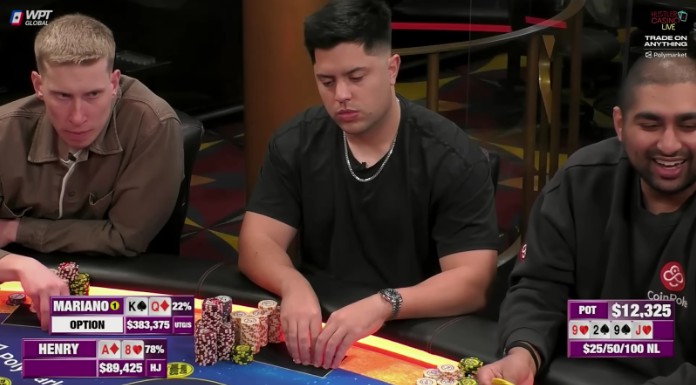
Over the past two years, Mariano has become the biggest winner on Hustler Casino Live with $2,906,240 in total profits.
His fearless yet disciplined approach has made him a fixture in the toughest lineups and a standout personality for poker audiences worldwide.
$30,000 Mariano Giveaway
Mariano launched his CoinPoker partnership with an upcoming $30,000 giveaway for new players on March 3.
Over a five-hour session, $1,000 will be awarded every 10 minutes to participating players, creating multiple chances to win throughout the event. More details are set to be released closer to the date.
Hustler Casino Live star Mariano Grandoli is back on the online poker streets and will host a very special meetup game next month – giving away $30k!
You won’t want to miss this, more details coming soon… pic.twitter.com/II00KcIfmn
— CoinPoker (@CoinPoker_OFF) February 6, 2026
Another Hustler Casino Live regular, Nik Airball, was also signed by CoinPoker recently and celebrated the partnership by giving away 1% of his Million Dollar Marathon winnings, totaling $13,500, to new players.
Who Is Brantzen Wong?
Brantzen Wong, known online as Brantzen Poker, represents poker’s next generation of video content-driven professionals.
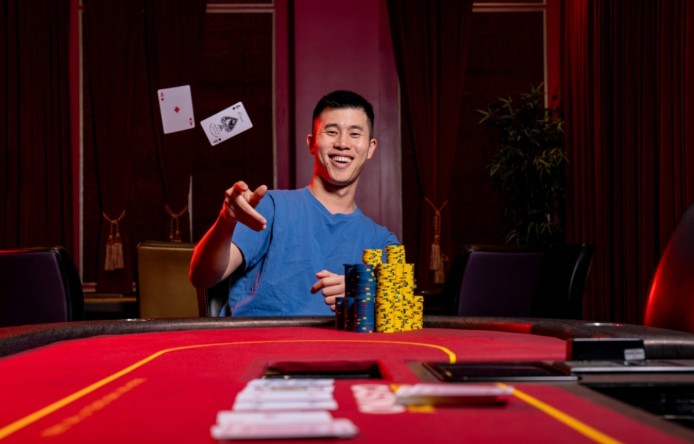
Based in Southern California, he has built a large following of 437,000 YouTube subscribers by documenting his poker journey.
Brantzen has recorded 31 live cashes, including a runner-up finish at the 2025 APT Championship in Taipei.
He frequently appears in live and streamed cash games. His approachable personality and serious work ethic have made him a relatable ambassador for aspiring competitive players.
Brantzen announced a $500 giveaway for five players that sign up with code BRAN, and is also set to hold a meetup game similar to Mariano.
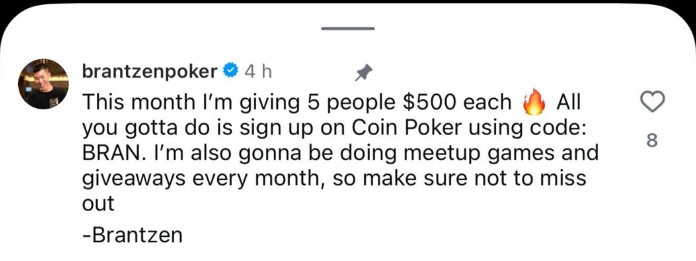
YoH Viral Finishes Runner-Up in Onyx High Roller Series Event #3 for $870,000
The CoinPoker ambassador announcement was accompanied by immediate success at the tables. Just one day later, YoH Viral reached the final table of the Onyx Super High Roller Series Event #3: $50,000 NLH Grand Slam.
Facing a stacked final table including the likes of Thomas Mühlöcker, Igor Yaroshevskyy, Tom Vogelsang, and Matthias Eibinger, YoH made it all the way to heads-up play.
His opponent, Matthias Eibinger, entered heads-up play with a commanding chip lead of more than four to one. YoH Viral battled back but was ultimately unable to close the gap, earning $870,000 for his runner-up finish.
About CoinPoker
CoinPoker is a global online poker platform built by poker professionals for poker players. Combining cutting-edge technology with a player-first ecosystem, CoinPoker delivers secure, transparent, and competitive poker games for players worldwide. It also now has an iphone compatible poker platform, as well as Android, available in-browser with no download required.
Poker gives you two kinds of adrenaline. One comes from solving a puzzle in public, with chips on the line and your brain doing quick arithmetic. The other comes from the quiet click of repetition, when you run the same spot often enough that a good decision starts to feel ordinary.
You build skill faster when you treat free play and real-money play as two different training tools. Free games help you learn mechanics and volume. Real money adds pressure, and pressure changes behaviour, so you use it when your process holds up and your bankroll can take the bumps.
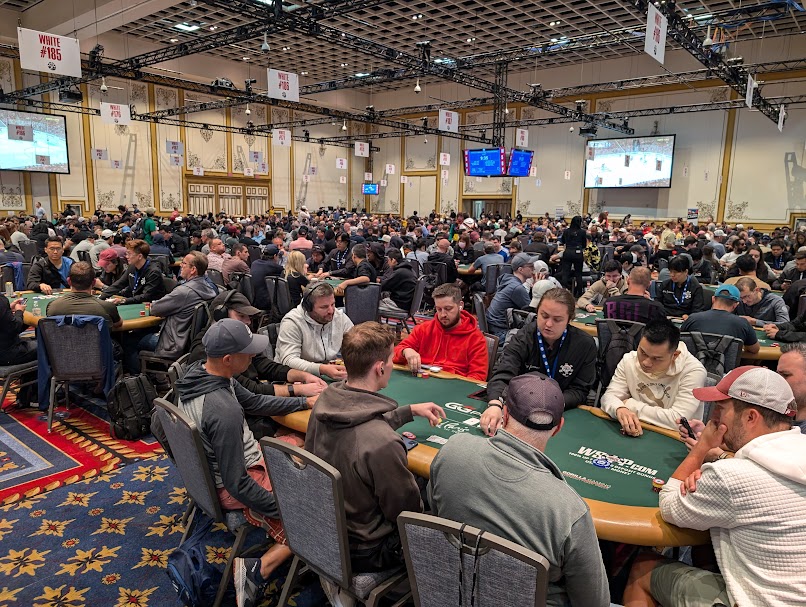
Free chips, real reps
Start with structure because structure turns chaos into practice. Casino.org’s guide to the best free poker options gives you a clean comparison point, since it lays out what “free” looks like across play-money rooms, game formats, and features you can use for drills. You use that page like a gear guide: pick a format, pick a routine, then repeat it until you stop thinking about buttons and start thinking about decisions.
Casino.org also hosts Replay Poker, a free-to-play game built for learning rhythms like opening ranges and bet sizing. In the simplest terms, you sit with play chips, you face real players, and you practise the same fundamentals that carry into online poker later. Replay Poker’s own terms on Casino.org say players must be 18+ and that the game offers optional in-app purchases while offering no real-money gambling or prizes.
Free play works best when you treat it like a lab. You can run 200 hands of small-ball pots in one sitting and track how often you reach showdown with top pair. You can also practise table selection habits, even in play chips, by choosing softer tables and learning how player types announce themselves through timing and bet size. That work feels like a Rocky montage, only with fewer steps and more spreadsheets.
What money changes at the table
Money changes the “pain of paying,” which researchers have discussed in the context of cashless and digital gambling design. A review in Addiction Research and Theory summarises findings that stake framing and payment form can affect arousal and behaviour, even when the game rules stay the same. For poker, that translates into tighter folds, rushed bluffs, and weird hero calls that appear when your stomach joins the decision.
This is why the bridge from free to real works best when you carry one routine across both. You practise the same preflop ranges, the same three bet sizes, and the same post-flop checklist, then you watch which parts of your game wobble once money sits in the pot. When you spot that wobble, you take it back to free play for volume, then you return to real money with the edges sanded down.
When practice becomes play
You can use a simple readiness test that has nothing to do with bravado. If you can explain your last big decision in one sentence that includes a range, a plan, and a reason, you have a process. If you keep that process through a downswing week, you have something sturdier than vibes. That is the moment real money starts offering useful feedback instead of pure stress.
Tournament poker offers a useful lens here. It shows what pressure looks like at scale. The World Series of Poker Main Event drew 10,112 entries in 2024, with a US$10,000 buy-in and a US$94,041,600 prize pool, and the champion earned $10,000,000. That event turns decision quality into a public spectacle, yet the winners still talk about the same basics: patience, position, and playing the player.
You also get a modern example of skill plus pressure in Justin Saliba’s results, such as his 2021 WSOP Online High Roller Freezeout victory for $253,800. That win sits at the intersection of technical skill and emotional control, as freezeouts reward steady execution without the safety net of rebuys. A player reaches that level by drilling fundamentals in low-risk environments, then testing them in games that bite back.
A practical move-up plan that respects your bankroll
You can treat your move from free play to real money like a level gate in a video game. You pass it through consistency, not through a single hot run.
Here is a plan that fits most players and keeps the learning clean.
- Set a session goal that measures decisions, like “mark 10 hands for review,” because outcomes swing and decisions teach.
- Start real money at micro stakes and keep buy-ins small enough that you keep thinking clearly. Clarity produces better learning than bravado.
- Track one leak at a time, like calling too wide preflop. Focus beats scattershot fixes.
- Review hands the next day, because distance improves judgment and turns feelings into notes.
- Use regulated markets for real money play, because regulation adds oversight.
If you keep one idea in mind, keep this one. Free poker builds your hands and your habits. Real money tests whether those habits survive contact with pressure. When your process stays steady, the game starts paying you in the only currency that matters, which is decisions you trust.
AI detection systems help protect fairness across many online poker and gaming sites. In fact, big platforms actively ban real-time AI assistance and bots to protect players. Even industry reports show that these tools play a growing role in maintaining trust.
Behind the scenes, developers are building smart tools that track patterns and flag odd habits quickly. Insights shared on gamblingsites.com also show how the best sites have controls around fair play. Let’s see how AI keeps poker fair.
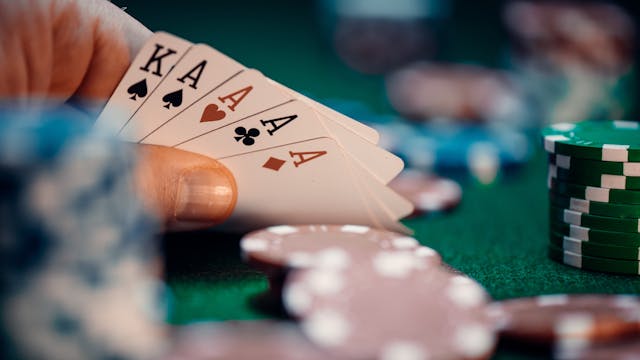
Why AI Is Essential for Fair Poker Play
Today, machine learning (ML) tools scan thousands of poker decisions in mere fractions of a second. That’s why platforms rely on AI to catch shady moves that no human team could track. This constant monitoring helps every player to enjoy a fair and balanced experience online.
Catching unfair play also boosts overall trust in the online poker community. As such, most major platforms ban real‑time AI assistance and bot use to ensure fair competition. With such clear rules, integrity comes first for long‑term enjoyment.
These AI systems often compare current actions against huge databases of verified past play. They can spot patterns human players rarely show during typical sessions. When unusual behavior pops up, the system flags it for human review immediately.
AI also guides modern security rules and penalty decisions across platforms. Without these tools, detecting subtle cheating would take far longer and risk missing cases. In turn, fair play standards can improve whenever cutting‑edge tech works consistently behind the scenes.
How Sites Spot Bots and Cheaters in Real Time
AI tools can track reaction times and decision patterns across thousands of poker hands. Since bots play with almost perfect consistency, humans simply cannot match. Thus, systems trained to compare human and machine patterns can spot these differences quickly.
Then again, real‑time assistance detection can examine every decision path against optimal strategy choices. When actions line up too closely with a perfect strategy repeatedly, alarms trigger. This fast monitoring helps prevent unfair players from impacting the wider community.
Today, platforms have already used these tools decisively in recent policing cycles. For instance, GGPoker removed 42 accounts and seized $1.2 million for AI‑style cheating. These examples show how modern enforcement relies heavily on smart detection systems.
AI systems also help catch multi‑accounting by tracking unusual habits across accounts. When accounts show identical action patterns or shared network traits, they get flagged. This kind of oversight strengthens fairness and keeps games more honest for everyone.
Real-Time Assistance Detection and Player Behavior
Real-time assistance (RTA) is software that helps a player make decisions mid-game. But platforms ban RTA as it undermines skill-based competition and fair gameplay standards. With AI detection tools, it’s easy to spot accounts showing patterns consistent with RTA use.
These systems can track thousands of variables, including timing, betting choices, and hand picks. Any unnaturally steady decisions often signal hidden aid tools at work behind the scenes. Once flagged, these accounts lose normal privileges and may face corrective action.
In recent policing cycles, platforms seized over $166,000 from accounts banned for RTA-style activity. Thus, platforms keep improving detection rules to catch new cheating methods fast. These measures show a clear commitment to integrity across online poker.
By watching behavior changes over time, AI learns to separate normal from suspicious play. This adaptive approach helps reduce false positives while keeping player trust high. Smarter detection tools ultimately make the overall poker community stronger and fairer.
AI Detection Tools and Responsible Play
AI detection tools do more than flag cheaters; they help platforms enforce responsible play policies. By spotting unusual patterns, they support broader efforts to maintain healthy poker play. In fact, responsible play efforts rely on this data to spot behavior needing review.
These tools also help communities trust competitive settings much more deeply over time. When players see enforcement actions happening, their trust in the platform usually grows. Thus, clear, fair rules like these keep people engaged and satisfied with their experience.
Modern platforms even publish transparency reports to show how many accounts faced AI detection. These reports help players learn control levels and patterns in abusive play. Thanks to public disclosures, everyone has a clear view of how tech improves poker security.
Moreover, smart detection helps reduce disputes by providing clear evidence for actions taken. For players, they feel reassured knowing that systems back decisions with reliable data. This transparency strengthens overall trust in how platforms govern play.
Keeping Poker Fair and Transparent
AI detection systems are now a key part of fair poker experiences online. That is, they catch bots, RTA, and suspicious play quickly and reliably every day. Plus, both players and platforms benefit from these protective tools in modern, dynamic environments.
As tech evolves, these tools will make poker even fairer and more transparent. Integrity will actually be a core part of the game with smart detection and enforcement. In the end, players can enjoy poker knowing that fairness rides on powerful technology.
Poker looks self-contained, yet the thinking behind it appears everywhere. Strong players rely on probability awareness and measured risk. They also rely on emotional control. Those skills develop faster when tested in settings where outcomes arrive quickly and mistakes show themselves clearly. Online card games provide that environment. They remove table talk and social pressure. What remains is decision quality.
Canadian players increasingly use other card games as training tools rather than side entertainment. Blackjack and baccarat stand out because they compress decision cycles. Each hand ends fast. Each result delivers feedback. This structure helps players internalise odds and consequence. It also explains why these titles consistently rank among the best online casino games available in Canada, particularly for players who value thinking over spectacle.
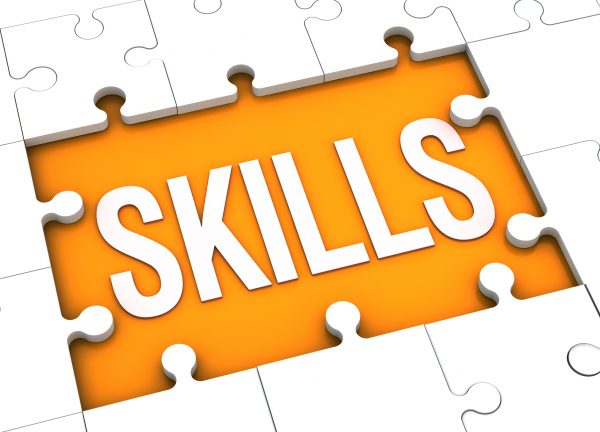
Decision Speed and Mental Clarity
Poker rewards patience, yet it punishes hesitation. Players must decide with partial information and limited time. Other card games train that exact muscle. Blackjack, for example, forces action on every hand. There is no waiting for a better spot. A choice must happen, and it must happen now. There’s no time to second-guess.
That pressure builds clarity. Optimal blackjack strategy reduces the house edge to about 0.5 percent, showing how much correct decisions matter over time. The lesson transfers directly to poker. When players trust math instead of instinct, results stabilise. And that’s the mindset you have to take into a game like blackjack. Instead of fearing the numbers, befriend them.
The repetition matters as much as the math. Blackjack delivers similar scenarios again and again. Players stop guessing. They respond. Over time, decision-making becomes automatic. Poker players benefit from that automation, especially in high-volume online play where fatigue causes errors more than ignorance ever did.
Baccarat and the Shape of Risk
Baccarat strips decision-making down to its bones. Players choose where to place a bet and then accept the outcome. That simplicity reveals how risk actually behaves. Betting on the banker hand carries a house edge of roughly 1.06 percent, making it one of the most stable wagers in casino gaming. Knowing the house edge helps more than you might initially understand.
For poker players, the value lies in discipline. Baccarat teaches restraint without lectures. Chasing losses fails quickly. Overbetting ends sessions early. Calm repetition lasts longer. These lessons mirror poker realities. Winning players survive cold runs because they protect their stack. Baccarat reinforces that behaviour through consequence rather than theory.
Emotional Control Under Repetition
Poker often disguises emotional mistakes as boldness. Other card games expose them. Baccarat sessions make impatience visible. Blackjack streaks test confidence. Players either adjust or bleed value. Over time, emotional control becomes a survival skill rather than a virtue.
This emotional training matters more than most strategy charts. Tilt ruins more bankrolls than bad cards. By practising calm decision-making in simpler games, poker players reduce the emotional charge tied to variance. They return to poker steadier and less reactive, which improves long-term performance.
Video Poker and Precision Thinking
Video poker occupies a unique space. It looks casual, yet it demands precision. Players receive a hand and choose which cards to hold. That single decision determines the result. In games like Jacks or Better, optimal play can push returns above 99 percent.
The appeal for poker players lies in clarity. Errors reveal themselves over time. Correct play produces consistent outcomes. Video poker sharpens hand recognition and probability awareness. Those instincts transfer directly to poker, especially in marginal situations where small edges matter most.
Seeing Probability Without Distraction
Poker includes bluffing and social reads (in a live setting). Those elements add noise. Other card games remove that noise. What remains is pure probability. Players see how odds unfold without interference. This exposure improves intuition in subtle ways.
When poker players return to complex environments, they recognise probability patterns faster. They feel when a bet makes sense. They also sense when restraint saves money. These judgements develop through repetition rather than memorisation.
Adapting to Different Game Rhythms
Each card game moves at its own pace. Blackjack runs fast. Baccarat moves steadily. Video poker isolates decisions entirely. Switching between these rhythms trains adaptability. Poker rewards that skill. Tables change. Stack sizes fluctuate. Opponents behave unpredictably.
Players who train across formats respond more smoothly to those shifts. They do not freeze when conditions change. They adjust without drama. That adaptability often separates consistent players from volatile ones.
Bringing the Lessons Back to Poker
When players integrate these experiences, poker decisions sharpen. Bet sizing becomes deliberate. Risk tolerance improves. Emotional swings lose influence. None of this comes from chasing novelty. It comes from controlled exposure to decision-making environments.
Online card games offer Canadian players a practical way to develop poker fundamentals without pressure. Each format teaches a different lesson. Together, they build stronger judgement. Poker remains the destination, but the surrounding games quietly shape better players, one decision at a time.
The first wave of online casinos prioritised convenience above everything else. Play was quick, smooth, and uninterrupted. But the process behind each result remained out of sight.
Over time, Canadian players began asking for more transparency. They wanted to understand how games worked, not simply accept outcomes on trust. That shift now shapes how casinos are compared, with trusted Canadian gambling sites evaluated by experts offering a clearer way to assess reliability.
Live dealer formats grew naturally from this change. By showing real dealers and real tables, they restored visibility and slowed the experience to a pace many players recognise.

What Defines Live Poker and Live Dealer Games
Live dealer games are built on physical tables and human dealers. Games are streamed live from studios or licensed casino floors. Cards are handled manually. Wheels turn in full view. What players watch is the real action.
Participants join the table together. Bets are made digitally, but play happens live for all. Outcomes are not generated afterward. Each result belongs to a single moment shared by the table.
Live poker follows a different structure. Instead of playing against the casino, players compete with each other. The dealer still handles the cards and manages the pace, but the result depends on player decisions rather than house rules.
That distinction matters. Live dealer games focus on fixed outcomes. Live poker is shaped by strategy. In both formats, visibility replaces automation, giving players a clearer sense of how each result is reached.
Player Experience Compared to Standard Casino Games
Traditional online casino games move fast. Rounds are short. Results appear at once. Players shift from one game to another without stopping. The system is efficient, but it can feel remote over time.
- Live dealer tables slow the pace. Players share the same table and follow each step as it happens. A real dealer sets the rhythm and keeps the game ordered.
- Even limited interaction matters. A short message in the chat or a spoken update from the dealer reminds players that someone is present. The game feels managed, not generated.
- Visual trust also shapes the experience. Seeing cards shuffled or results announced reduces uncertainty and makes gameplay easier to follow.
The pace is slower by design. Each round unfolds, reinforces patience and mirrors land-based casinos. For many Canadian players, this familiar tempo makes live gambling feel more grounded and less mechanical.
Technology That Supports Live Dealer Play
Behind each live dealer table is a complex technical framework. High-definition cameras capture fixed angles of gameplay, creating a continuous video stream delivered to players in real time.
Recognition technology reads cards, wheel numbers, and results instantly. This data is transmitted directly to casino systems, allowing bets to be settled accurately and without delay.
Stream reliability is essential. Even minor interruptions can affect player confidence. Canadian casinos therefore rely on robust servers, backup networks, and optimized delivery systems to maintain stability.
Security functions quietly in the background. Encrypted connections protect financial and personal information, while independent audits verify that digital records match visible outcomes.
Most players never see these systems, but they define the experience. When technology performs smoothly, gameplay feels natural. When it fails, trust is quickly affected.
Impact on Canadian Online Casino Platforms
The growth of live dealer gaming has changed how Canadian casinos structure their platforms. Live tables are no longer optional additions. They are now central to player engagement.
This shift has produced measurable effects:
- Longer session times, as players remain seated at live tables
- Higher loyalty, driven by routine and familiarity
- Greater investment in studios, dealers, and technical staff
- Expanded live offerings, including poker and table variants
- Higher operational standards, focused on stability and presentation
Casinos now compete on execution rather than quantity. Stream quality, dealer professionalism, and table management influence player choice.
Independent analysis has become increasingly important. CasinoRIX experts regularly review platform performance, live dealer reliability, and overall structure. Resources help players identify operators that maintain consistent standards rather than short-term promotions.
Conclusion: How Live Dealer Formats Shape the Future
Live poker and live dealer tables have changed how online casinos are viewed in Canada. Players now judge platforms by how they behave, not just what they offer.
Visibility matters. Pacing matters. Human presence matters.
Live formats replace abstraction with observation and bring structure back into online play. As technology improves, these games are likely to expand further, with more table types, regional studios, and refined interaction.
The direction is clear. Canadian online gambling is moving away from purely automated systems toward experiences that feel deliberate and transparent.
Live dealer gaming is no longer a novelty. It has become part of how trust is built — and how players decide where to play.
Bad beats hurt. Getting all-in with pocket aces only to watch someone hit their two-outer on the river feels terrible every single time. The frustration doesn’t really go away but learning how to handle it separates winning players from everyone else.
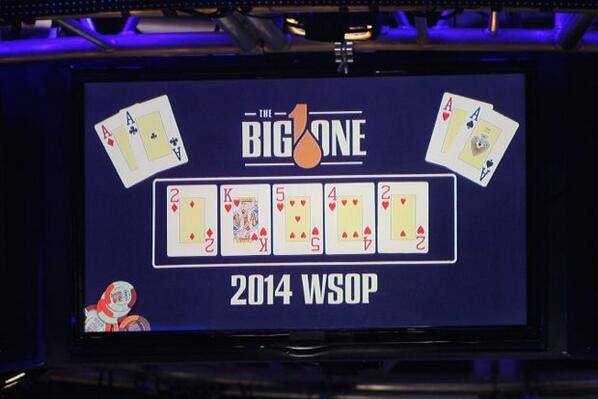
What Actually Counts as a Bad Beat
A bad beat happens when chips go in as a heavy favorite but the hand loses anyway. Say someone flops the top set against a flush draw and loses when the flush hits. That’s a bad beat technically, even though the flush draw had about 30 percent equity. Understanding this changes everything. Pokerology’s overview of fundamental poker concepts explains how variance works over time, and accepting that bad beats will occur helps prepare mentally for when they inevitably show up.
The Expectation Problem
That one time out of five when the underdog hits though? Complete meltdown. The reaction seems justified but it shouldn’t be, because that one-in-five loss is just as expected as the four-in-five wins. The randomness of which specific hand becomes that one loss makes it feel personal when it isn’t.
Here’s something weird that makes sense once you think about it. Good players actually experience more bad beats than weak players do. Solid players get their money in good positions more often, which means they’re favorites more frequently, which means they get sucked out more frequently too.

Taking Breaks Saves Money
Nothing preserves a bankroll better than stepping away after a brutal beat. Whether that’s five minutes or five days doesn’t matter as much as actually doing it. The urge to win the money back immediately destroys more bankrolls than the bad beats themselves. Players who stay after getting crushed often start chasing, making huge bluffs, calling with garbage draws. The thinking becomes “if they can win with junk, so can I” which leads to spewing chips everywhere. Taking time to cool down and returning with a clear head prevents this completely.
Sklansky Dollars and Long-Term Thinking
Understanding poker stats is important to ensure winning. The 10 percent chance of losing exists and will hit eventually. Getting caught in that 10 percent doesn’t change the fact that the decision was correct and profitable long-term. Poker is essentially one long session anyway; individual results matter way less than decision quality over thousands of hands.
Without bad beats, poker wouldn’t be profitable for anyone. The random element keeps weak players coming back because they remember that time they rivered a flush against the top set. Those occasional wins trick them into thinking their play was correct or that poker is mostly luck. Good players should be grateful for bad beats in a weird way. They’re what keeps recreational players in games, convinced they can win despite making terrible decisions most of the time.
Conclusion
Managing tilt long-term requires work beyond just taking breaks. Meditation helps, yoga helps, working with a mental game coach helps. Getting in the right mindset before even starting a session reduces the likelihood of tilt affecting play later. Studying poker fundamentals before playing can reset focus and put the brain in a logical decision-making mode instead of an emotional one. Professional players know time is money though, so finding quick reset methods becomes crucial for staying in action without playing badly. The goal isn’t eliminating emotional reactions to bad beats completely. That’s probably impossible. The goal is controlling those reactions enough that they don’t leak chips through subsequent bad decisions. Winners feel the frustration too; they just don’t let it change how they play the next hand.
Justin Saliba has quietly built a reputation as one of the most thoughtful and versatile poker coaches on PokerCoaching.com. While some instructors lean into theory or pure exploitation, Saliba sits comfortably in the middle. His videos consistently show how elite players actually study, think, and adjust.
Saliba doesn’t just show charts and solvers. He explains how to use them, when to deviate, and how to turn study time into real results. Below are the five best PokerCoaching training videos from Justin Saliba, each highlighting a different pillar of modern poker success and showcasing why he’s such a valuable voice for players looking to level up their game.
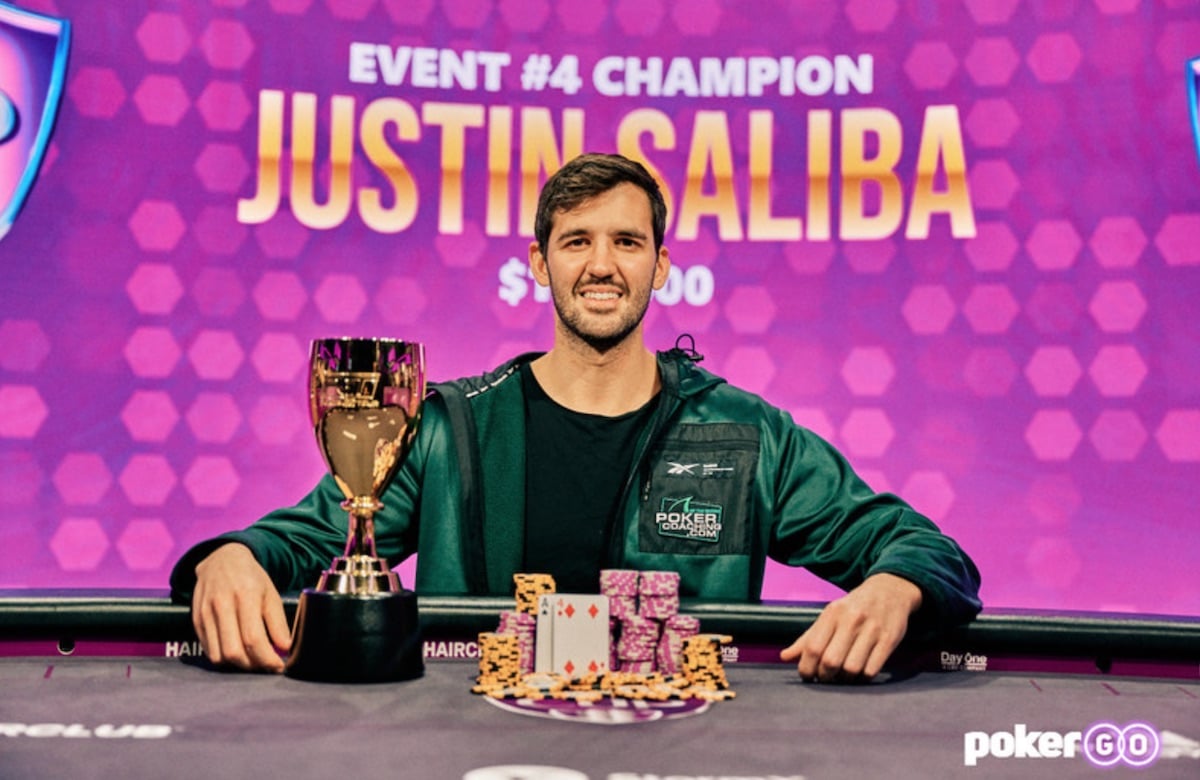
1. How to Study with Justin Saliba
This 50-minute video is essential viewing for anyone who’s ever wondered whether they’re studying poker the right way. Rather than focusing on flashy hand histories or advanced exploits, Saliba zeroes in on the process. He walks through how he personally uses software to sharpen his decision-making on the flop, both in position and out of position.
Saliba emphasizes that meaningful study requires a deep understanding of both players’ ranges across many scenarios, not just memorizing your own strategy. He carefully breaks down each step of the hand, showing how small changes in ranges can dramatically affect optimal decisions postflop.
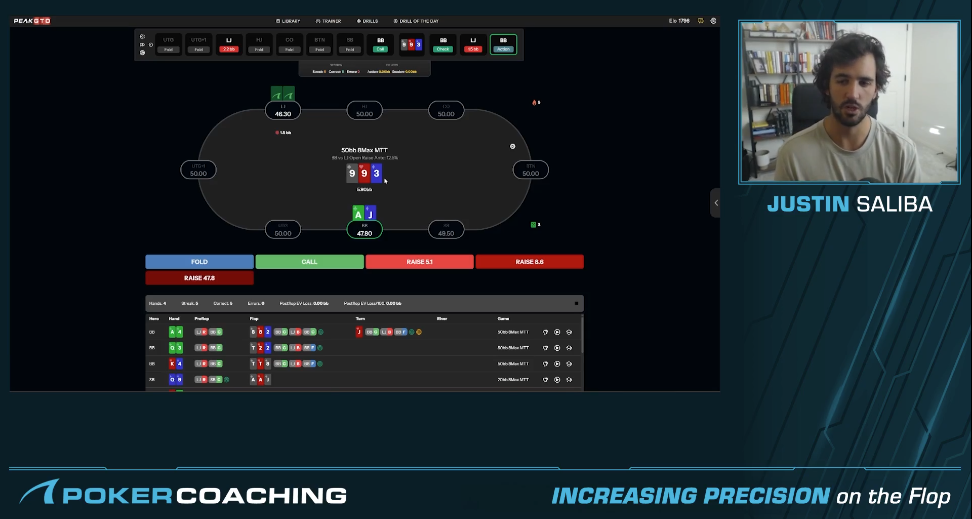
What really elevates this lesson is how Saliba bridges theory and practice. After analyzing the hand, he jumps into PeakGTO’s drill library to replay similar spots, reinforcing concepts through repetition. This video isn’t just about learning poker; it’s about learning how to learn poker.
WATCH: How to Study with Justin Saliba
2. Mastering Blind vs Blind Strategies in MTTs (25bb Study)
Blind-versus-blind play at 25 big blinds is one of the most uncomfortable and misunderstood spots in tournament poker, and Saliba tackles it head-on in this 35-minute breakdown. Using GTO preflop charts as a foundation, he explains why a polarized strategy is mandatory.
At this stack depth, ranges are wide, equities run close, and players are frequently forced into all-in decisions across multiple streets. Saliba does an excellent job explaining why polarization works here, rather than simply telling viewers what buttons to click. He connects stack depth, positional disadvantage, and future street play into a cohesive strategic framework.
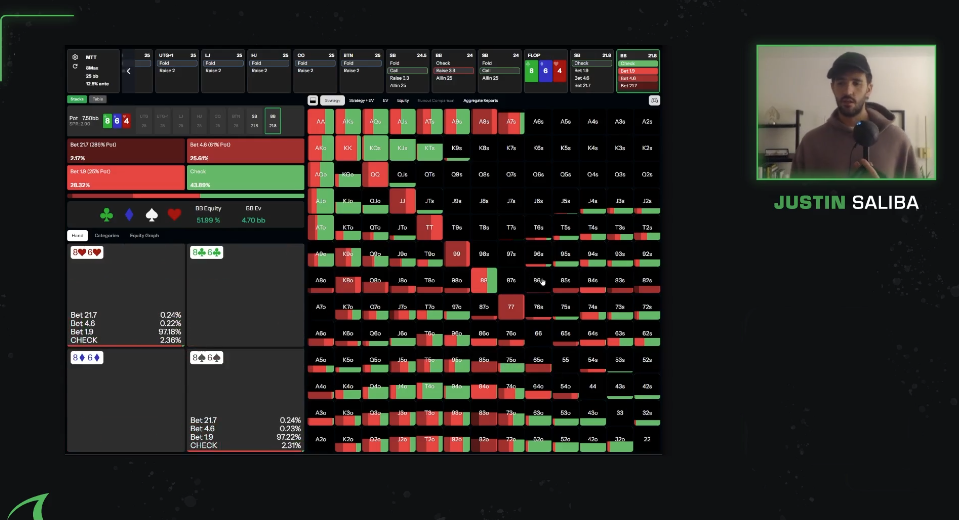
Saliba also offers insight on his tournament instincts in this video lesson. He talks through the emotional swings and inevitable collisions that come with blind-versus-blind play, showing how resilience and adaptability are just as important as technical precision.
WATCH: Mastering Blind vs Blind Strategies in MTTs (25bb Study)
3. Defending vs Aggression in Deep-Stacked Cash Games
In this 28-minute session, Saliba steps into the world of high-stakes cash games, drawing directly from his own experience playing at $25/$50. While many players think of him as a tournament grinder, this video makes it clear that he’s just as dangerous in deep-stacked cash.
Saliba walks through real hands and explains how he selectively applies GTO concepts in games where opponents are far from optimal. Rather than blindly following solver outputs, he shows how to identify spots where opponents over- or under-bluff.
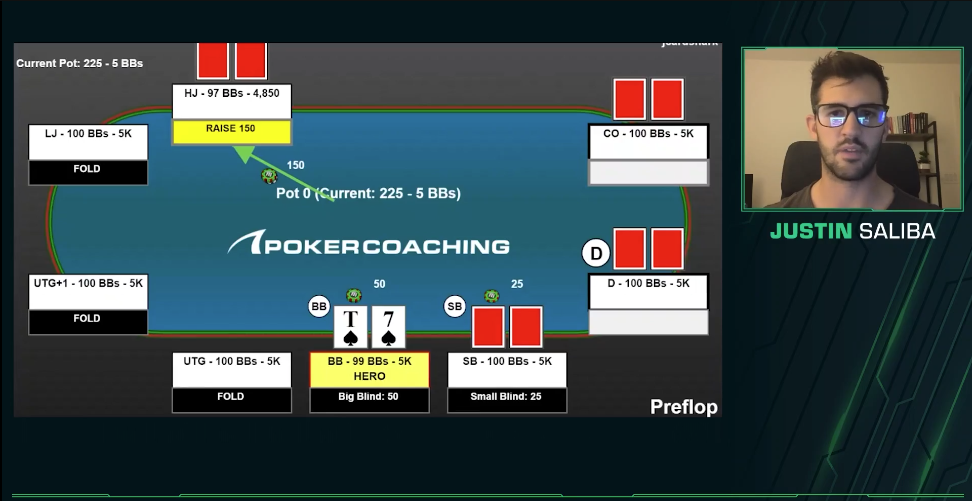
He openly discusses uncertainty, adjustment, and the importance of understanding your opponent’s tendencies. This video lesson provides a great reminder that GTO solutions are a tool, not a rulebook, and that elite cash game poker is often about choosing the right moments to deviate from what solvers will output as optimal play.
WATCH: Defending vs Aggression in Deep-Stacked Cash Games
4. Transitioning from Live to Online Cash Games
Moving from live poker to online cash games is one of the toughest transitions a player can make. In this hour-long video, Saliba explores the challenges that come with the shift, including faster decision-making, multitabling, and the importance of a solid theoretical foundation.
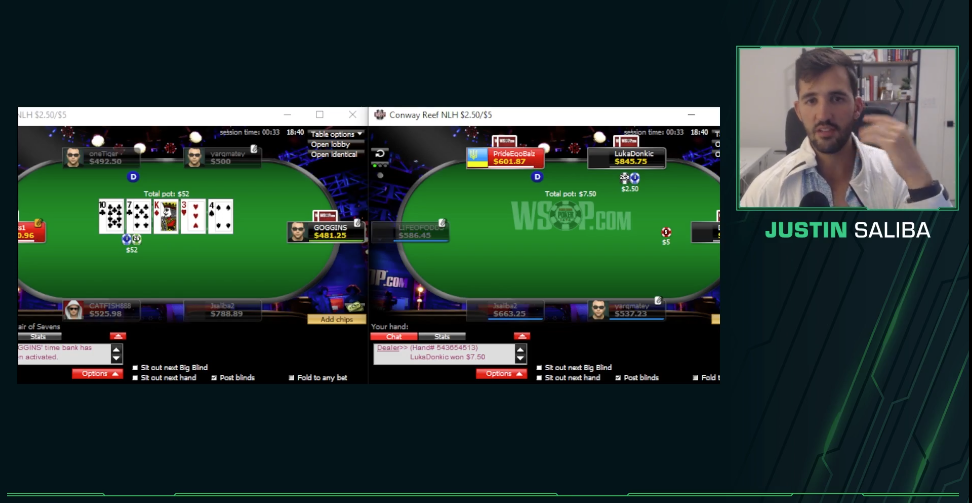
Saliba also dives into the subtle differences that many players overlook. Online poker games demand sharper preflop discipline, greater comfort with GTO concepts, and a different approach to interpreting information. While live tells fade into the background, bet sizing, timing, and population tendencies become far more important.
For live poker players considering a move online, or online players curious about the gap between formats, this video provides a roadmap that you can’t ignore.
WATCH: Transitioning from Live to Online Cash Games
5. 2-7 + Stand-Up Game Analysis with Next Gen Poker
Rounding out the list is one of Saliba’s most unique and entertaining videos. In this 45-minute session, he explores the nuances of playing No Limit Hold’em while the “2-7 game” and/or the “Stand-Up game” is on. Joined by NextGen Poker, Saliba breaks down the nuances of this unusual setup, analyzing hands from multiple player perspectives and highlighting how their incentives change based on the potential extra winnings/losses to be incurred when there’s the added 2-7 or Stand-Up game wrinkle in play.
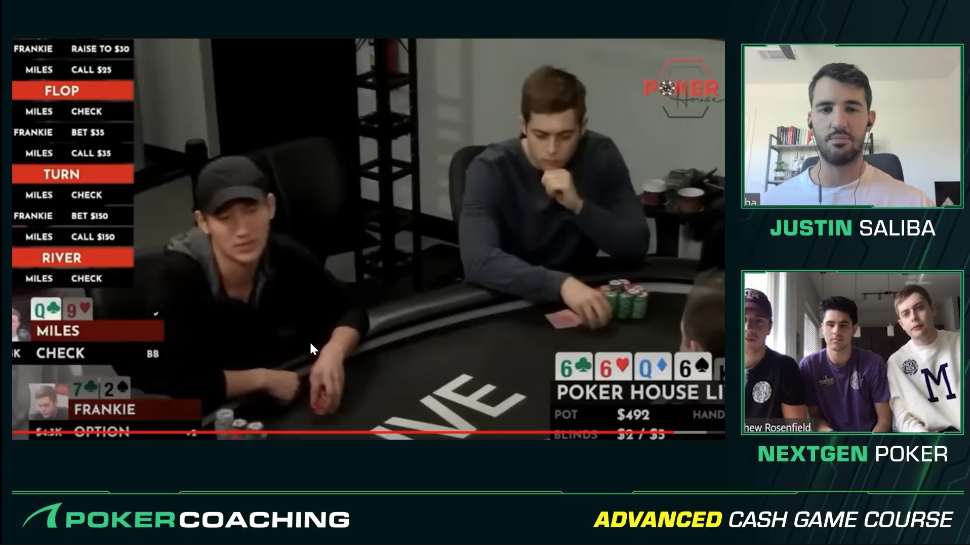
This video showcases Saliba’s versatility as both a player and a coach. He’s comfortable outside his comfort zone, curious about new formats, and eager to explore how fundamental poker principles adapt across games. For players looking to broaden their strategic horizons beyond the basics, this lesson is a standout.
WATCH: 2-7 + Stand-Up Game Analysis with Next Gen Poker
Conclusion
Justin Saliba’s PokerCoaching videos offer a clear window into how a modern, high-level player actually thinks. Whether he’s teaching study habits, breaking down tough tournament spots, or experimenting with cash game formats, Saliba balances theory with real-world application.
For players serious about improving their decision-making and understanding poker at a deeper level, Justin Saliba’s training is not just worth watching, it’s worth revisiting again and again.
Poker is not just about playing cards; it’s about making smart decisions over time, especially with your bankroll. If you want to enjoy the game longer and avoid unnecessary stress. You need a clear money strategy. The good news is that this doesn’t have to be complicated. With a few smart habits, you can protect your funds and play with confidence. Here are five practical strategies to help you manage your money when playing online poker.

Set a clear bankroll before you play
Decide how much of your disposable income you are willing to use for poker before you sit down. This amount is your bankroll, and it should never interfere with everyday expenses. The importance of clear money habits extends beyond poker. In the UK, around 39% of adults say they don’t feel confident managing their money, and 11.5 million people have less than £100 in savings. This shows that financial discipline is far from universal.
A clear bankroll strategy means:
- Only using money you can afford to lose
- Treating your bankroll as a fixed limit, not something you top up after a bad session
- Avoiding loss-chasing or emotional deposits
- Keeping poker funds separate from personal finances, ideally through a dedicated account or payment method.
When your bankroll runs out, you stop playing. That discipline removes pressure from individual sessions and plays a major role in long-term sustainability.
Choose stakes that match your bankroll
Playing at the right stakes is just as important as setting a bankroll. Many players move up too quickly, hoping for bigger wins, but this usually leads to faster losses. This is a really important lesson when you’re learning how to play poker.
You want enough buy-ins to handle normal swings. Poker has ups and downs, even when you play well. Staying within your bankroll limits gives you room to recover from losing sessions without draining your funds.
If you feel pressure or anxiety every time you place a bet, the stakes are probably too high. Playing at comfortable levels helps you think clearly, make better decisions, and stay in control of your money.
Track your wins, losses and habits
Many players rely on memory to judge how well they are doing, and memory is rarely objective. Tracking your sessions gives you a clearer picture of how your bankroll actually moves over time. This doesn’t need to be complicated. A simple record is enough, such as:
- Deposits and withdrawals
- Games or formats played
- Session length
- Wins and losses
- Notes on focus, fatigue or decision-making
Over time, patterns start to emerge. You may find that certain formats or specific games like Texas Hold’em for example, suit you better, or that late-night sessions consistently perform worse than daytime play. This awareness allows you to make changes before a real problem can emerge.
Use fast payments and trusted platforms to stay in control
Fast deposit and withdrawal options are not just about convenience. They play a big role in helping you manage your poker money properly. When transactions are processed quickly, you always know where you stand. There is no confusion about pending withdrawals or delayed balances. That clarity makes it easier to stay disciplined and avoid overspending or losing track of your bankroll.
This is why many players look for poker platforms with reliable and fast cashouts. Casino.ca ranks the fast withdrawal casinos, making it easier to find poker sites that support better money management. When your money moves smoothly in and out of your account, you can stay focused on your game instead of worrying about your balance.
Choosing the right platform matters just as much as payment speed. Not all poker sites offer the same level of reliability or transparency. This is where Casino.ca becomes especially useful. It is a trusted resource for comparing platforms based on what actually matters, including withdrawal times, game variety and overall quality. Instead of signing up blindly, you can use the platform to narrow down options that fit your playing style and financial goals.
Know when to step away
One of the most overlooked money management skills in poker is knowing when to stop. This matters just as much during winning sessions as losing ones.
Stepping away becomes essential when:
- You are tempted to keep playing after a strong win and start taking unnecessary risks.
- Frustration after a loss pushes you to chase money you have already lost
- Fatigue or emotion begins to affect your decision-making.
To stay in control, set clear limits before you play:
- A maximum time limit
- A stop-loss amount you will not exceed
- A chosen point before playing, where you can cash out and leave the table
When those limits are reached, walk away. Poker will still be there tomorrow, and protecting your bankroll today gives you the chance to play better in the long run.
Turning good habits into long-term poker play
Taken together, these five strategies cover the essentials of poker bankroll management, from setting limits to knowing when to walk away.
Online poker rewards discipline just as much as skill. Managing your money properly gives you the freedom to focus on playing well without unnecessary pressure. When you treat money management as part of the game, poker becomes more enjoyable, more sustainable and far less stressful.
